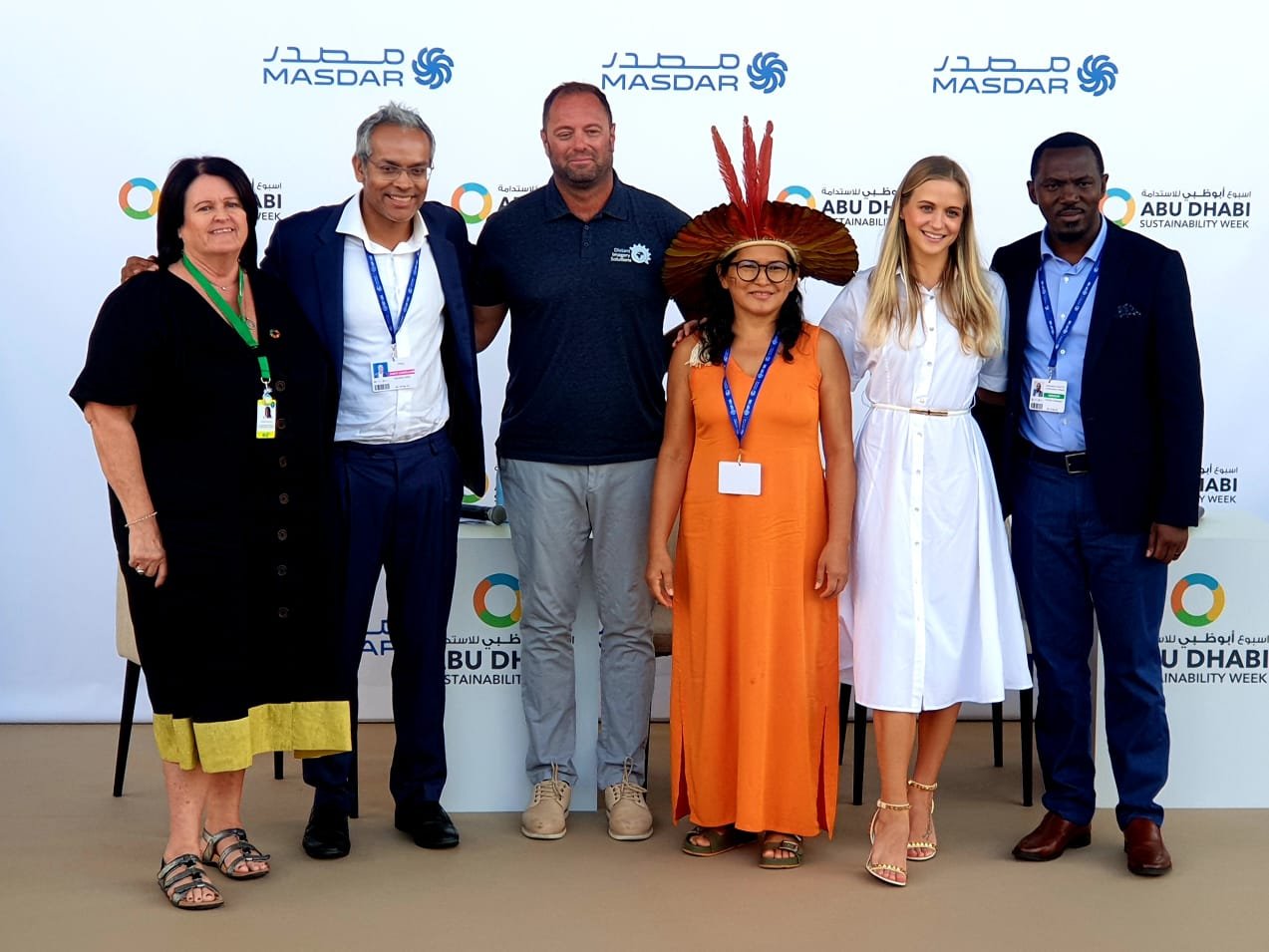Beyond the headlines: Climate, nature and protecting indigenous peoples’ rights
From Left to Right: Adrienne Doolan (CEO Green Touches), Tanzeed Alam (Moderator of event and MD of Earth Matters), Cory Rhodes (Co-Founder Distant Imagery), Neila Borari, Polina Kozel (ED CEG Invest) and Charles Karangwa (Head of NbS, IUCN)
“In the rush for carbon credits, we cannot see a new form of environmental colonialism”
- Tanzeed Alam, Managing Director of Earth Matters Consulting
On 6th December, Earth Matters Consulting, in partnership with Sustain UAE, Blue Forest and Distant Imagery Solutions organised an event as part of Abu Dhabi Sustainability Week’s Special Edition to COP28: SMEs on the Road to Net Zero. Our event aimed to highlight the importance of locally led Nature-based Solutions. The event opened with a powerful statement by Neila Borari (Collective of Indigenous Women As karuana do Tapajós in the Amazon), highlighting how vulnerable indigenous women are to climate change, as well as the hardships her people have faced regarding the deforestation and local corruption in her area. An estimated 29% of the Brazilian Amazon is “undesignated”, meaning it is public land, but no one has decided whether it should be a nature reserve, an indigenous reserve, or something else. Deforestation tends to be worst in areas where property rights are hazy. Neila’s closing comment hit home “they are killing us”. This point is echoed by indigenous people, demanding a greater voice at the COP.
Over the course of the event, panellists from Distant Imagery Solutions, CEG Invest and IUCN discussed the importance of NbS, case studies of best practice, including for finance and technology use for restoration and monitoring. The panel noted that NbS will never be a direct substitution for the phase out of fossil fuels. A "simultaneous incorporation" of NbS alongside the phase out was necessary.
Why Nature-based Solutions?
NbS play a key role in climate change mitigation and adaption. They not only have a range of positive impacts on the ecosystem, such as increasing biodiversity whilst lowering risk and vulnerability to the adverse effects of climate change, but they also are vital projects that positively impact both the people that create and use them.
The ocean, soil and forests are the world's largest carbon sinks. Below the soil, many of these areas (eg. peatlands, mangroves, old growth forests) often lock away stores of carbon from many millions of years and their degradation would render these ‘stores’ irrecoverable. If this irrecoverable carbon is released then we cannot meet the Paris Goals.
Over the course of the last 8 days at COP28, we have seen a lot of positive momentum towards mobilising climate finance, to assist the Global South with the creation of the Loss and Damage Fund, now standing at ~$700 million. We have also seen a mobilisation of funds towards Nature-based Solutions (NbS). Earlier this week, the UN Climate Change High Level Champion, Razan Al Mubarak announced a $1bn COP28 to COP30 partnership with Brazilian President Luiz Inacio Lula da Silva for the funding of NbS. Brazil’s environment minister also outlined an ambitious plan to create a $250bn fund that would pay a fixed sum per hectare of forest to countries that prevent their forests from shrinking more than a very small amount each year. If this fund can be filled, then it would be a welcome step towards addressing this issue of irrecoverable carbon and starting to fill the nature finance gap (see graph below).
Figure 1 Cumulative Amount of Investment Required in Nature-based Solutions by 2050 ($ billion), UNEP
Are there any downsides?
At COP28, there have been many stands in the green and blue zone of fossil fuel companies all getting very excited about the potential for carbon offsets through NbS.
What NbS cannot become are offset purchases for greenwashing across both the private and public sectors. All companies must do everything they can to reduce their emissions across all three scopes of emissions, and only offset the residual. We can already see examples of this where companies are beginning to take advantage of the increased demand for carbon credits. The UAE-based firm Blue Carbon, could gain control of over 30 million hectares, they are set to secure the rights to a fifth of the total landmass. If these developments do not safeguard the rights of indigenous people living there, then it cannot be seen as successful.
The UAE has a unique role to play here through the COP28 presidency and the High-Level Climate Champion, who also happens to be the President of the IUCN. If COP28 becomes the first climate COP to formally connect the nature and climate agendas as part of the Global Stocktake, then it must point towards the need for standards that protect the rights of indigenous communities, and provides social benefits to the poorest and most vulnerable. It must work closely with the Convention on Biological Diversity (CBD) and not contradict the good work that came out of the CBD COP in Montreal 2022. It is widely down to HE Razan al Mubarak that indigenous people and women have been well represented at COP28 – she has championed these causes for some time now. IUCN also has standards in place for NbS and indigenous people, which must be at the forefront of developing higher integrity carbon credits from NbS. High integrity essentially means better social development for the poorest and most vulnerable, and indigenous people.
In our bid to accelerate climate action, we must retain humility and understand why we are doing this and who for. The poorest and most vulnerable, including indigenous people, have a fundamental right to determine what is best for themselves. Any work on energy transition, adaptation and loss and damage has to benefit them the most.
EARTH MATTERS CONSULTING IS READY TO SUPPORT YOU IN YOUR JOURNEY, WHETHER YOU ARE A BUSINESS, GOVERNMENT ON NON-PROFIT ORGANISATION.
Email info@earth-matters.net or
call us on +971 (4) 368 0892




